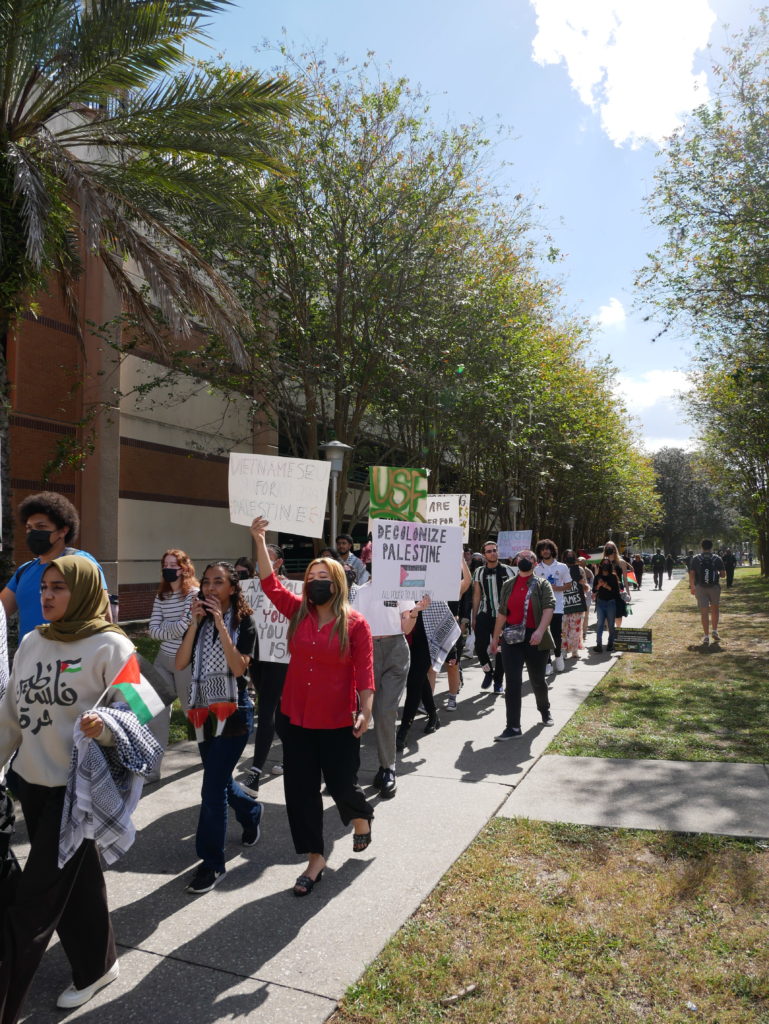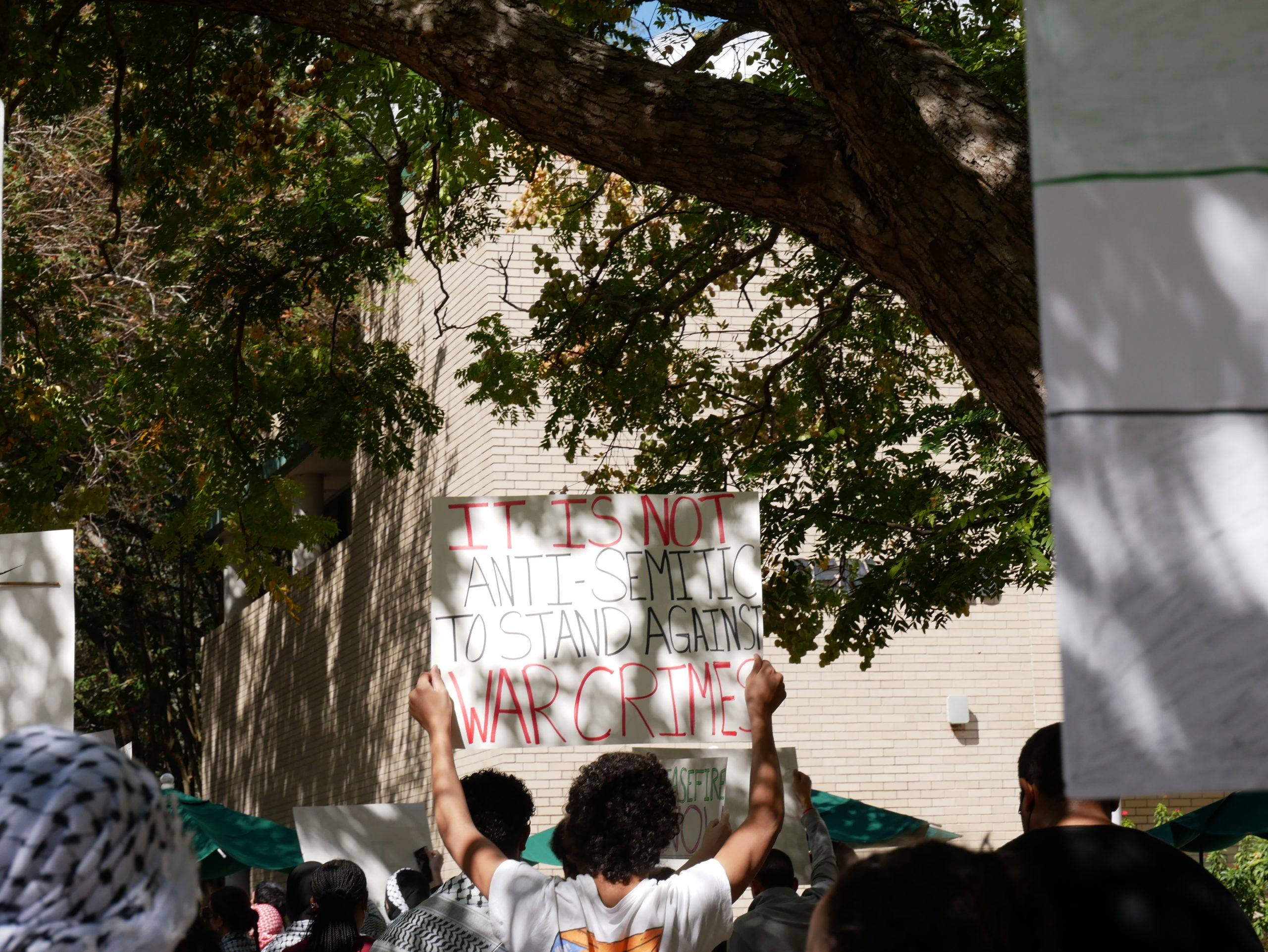USF Students are experiencing a slew of emotions as the conflict in Palestine and Israel heighten.
Photo by Alisha Durosier |The Crow’s Nest
By Alisha Durosier
“From the river to the sea,” the rallying cry for Palestinian freedom echoed throughout the University of South Florida on Nov. 9. Students chanted, marched and gathered in USF’s MLK plaza for “Shut it down for Palestine” — a call for global movements to organize walkouts and marches in demand for a ceasefire in Gaza and for Palestinian freedom from Israeli occupation.
From memorials to protests, college campuses across the nation have seen an emergence of demonstrations after the start of the Israel-Hamas war. Now entering its second month, the Israel-Hamas war began on Oct. 7 after the militant group, Hamas, carried out an attack on Israeli towns located near Gaza’s border. According to Israeli officials, approximately 1,200 people were killed in the attack. After their declaration of war against Hamas, Israel responded with attacks on the Gaza strip, with the death toll now surpassing over 11,000.
The walkout was organized by USF organizations Student’s for Socialism, Sisters United Muslim Association, and the Muslim Students Association in coordination with the National Students for Justice in Palestine. Students met in front of USF Tampa’s library, where a collection of signs were available for students to carry, before marching to the MLK plaza where students were given the opportunity to speak.
USF Tampa and St. Petersburg Hillel groups organized memorials following the Oct. 7 attack, lighting candles and singing hymns in remembrance of those who were killed.
The current war is the culmination of the ongoing 75-year conflict between Israel and Palestine, a dispute where impacts in the region are also felt internationally. With tensions running high across the globe, USF students are feeling the weight of the conflict in the aftermath of Oct. 7.
Many students who participated in the walkout wore masks to cover their faces, some speakers requested not to be recorded and students were advised to not give their full names to the press.
On-campus demonstrations also face the risk of taunting hecklers. During the walkout, a person rode through the MLK plaza interrupting a student’s speech. A month prior, when USF Hillel held their memorial three days after the attack, they encountered honking cars that drove outside of the Jewish Campus Life Center in Tampa.
Students are fearing for their safety, with worries of being targeted, harassed or having private information shared online.
“It’s a lot of really tough emotions regarding how we make sure that we responsibly organize,” Will, president of Students for Socialism said. “How do we make sure we put something together that reflects the safety and also the will of everybody that’s involved with this? So, for myself, I’m not particularly worried because I do come from that position of privilege, but I am incredibly worried about my friends, about my fellow organizers.”
Last month Florida Gov. Ron DeSantis called for the deactivation of the Florida chapters of Students for Justice in Palestine. The Florida University System, however, has not followed suit, allowing Florida Students for Justice in Palestine chapters to remain active.
Students for Socialism organizers make sure to take the necessary precautions.
“That’s why we had masks here today. That’s why we proofread speeches. We want to ensure that people’s faces are covered, they don’t give their names to the press, stuff like that. Just to ensure their safety and make sure they don’t get blacklisted,” Alina, the Students for Socialism vice president, said.
Alina comes from a Muslim background. With all the women in her family wearing hijabs, she is often on the defensive.
“I’m scared that it’s going to be a post 9/11 rise of Islamophobia,” Alina said. “Like there’s one terrorist attack perpetrated against your country by a specific group of people. And that means that you have to massacre an entire ethnicity, or you have to go to these different countries, and you have to just kill innocent civilians without regard to human life. Right? And then that’s how the American populace justifies it in their head.”
The U.S. has seen an uptick in Islamophobia and antisemitism since Oct. 7, leaving Muslim and Jewish communities on edge.
USF St. Petersburg Hillel Secretary, Sydney, feels her fear of antisemitism has come in waves, with the current war also igniting her more recent worries.
“I think a lot of our first thoughts were just like, how are antisemitic attacks going to start picking up again in the US? And do we need to start hiding that we’re Jewish, hiding like our star?” Sydney said.
“I think it’s just been really scary seeing that the one place in the whole world that’s supposed to be the safe place for Jewish people out of anywhere is really not safe anymore,” USF Hillel President, Aviya said. “So, if the only Jewish nation in the world isn’t safe, how safe can we be in the United States?”
Currently, if police aren’t present at events hosted by USF St. Petersburg Hillel, they search the area where Hillel events or meetings occur. Before Hillel’s memorial, USF police searched the area between the library and Bayboro Harbor, checking trash cans and flowerpots.
A lot of the hateful rhetoric that has stemmed from the conflict is often attributed to conflation.
“I think that the conflation between the Israeli government and Jewish people is kind of stupid. It’s like if I disapprove of the American government’s actions, do I hate all white people or something?” Alina said. “… People conflate Hamas, terrorists, with all of Gaza, all of Palestinians and then they conflate Palestinians, all Arabs, all Muslims, [and] all Muslims are terrorists. It’s really ridiculous.”
“I think one of the most important things is that we need to be able to separate a government from a people and also that from a land, so it’s been the land of Israel and the land of Palestine for some people since before countries were even really a thing,” Aviya said. “Honestly, I am so disappointed in the Israeli government in many ways and I think it just is a bad look and it puts a bad look on all of us because Jewish people are being attacked for what the Israeli government is deciding to do.”

Photo by Alisha Durosier | The Crow’s Nest.
In the past five weeks Israel has bombarded the Gaza strip with the aim of eradicating Hamas.
“And I feel like that statement in itself that if you don’t support Israel, you’re antisemitic. I feel like that itself is antisemitic because Israel to me is not necessarily reflective of the Jewish religion very well, to me it’s very much a violent apartheid state that doesn’t really reflect well on these people’s wishes,” Will said.
As the current war continues, students experience not only feelings of fear but of discouragement.
“I would describe it as grief for me because I’ve been every single time, I see a video of a Palestinian dying or buried under rubble or in a hospital or something. I want to learn their faces, learn their names and their stories,” Alina said.
“So many civilians, so many Israeli civilians, so many Palestinians have been brutally murdered. And it feels like the world is going a little crazy because the focus isn’t on all these innocent lives,” Will said. And I feel like when the world should be calling for a ceasefire and we’ve seen working people calling for a ceasefire, but the governments of their countries are not reflecting their interests at all. So, it’s frustration. It’s dread.”
Aviya also finds frustration in the denial of Jewish connection to the land Israel inhabits.
“This awful humanitarian issue, has given people an excuse to kind of share their little glimpse of antisemitism that they hold within them and just denied Jewish heritage, denied Jewish culture and really just people who had no interest or involvement in this issue up until a month ago, going to Jewish people and denying their indigenous connection to this land,” Aviya said.
Students are urgently demanding a ceasefire.
“First, I want to see an immediate ceasefire and that doesn’t do anything to resolve the core issues which is colonialism and apartheid and genocide and the hate that has been created in Israel and Palestine. But immediately all I can hope for is a ceasefire,” Will said.
Those in support of Palestinian freedom also seek to divert any funding of Israel, by boycotting Israeli goods and pressuring the U.S. to reduce their financial support of Israel.
“Regionally, we want to see divestment. Like USF should divest from the corporations that are supplying Israeli genocide, weaponry and stuff. And we want to see people boycotting all Israeli food products to make sure no money gets to them.” Alina said. “We want to see people boycotting everywhere, outside of the region too … We want the US government to divest from Israel.”
Students are wishing for a peaceful outcome and for the safety of both Palestinians and Israeli citizens.
“If we’re able to get rid of this militant group, then hopefully, then hopefully Palestinians can have more of that self-determination in deciding who’s going to rule them and what kind of government they’re going to have because they don’t have a government right now.” Aviya said. “And then hopefully they can be their own people in their own land where they want to be and the Israeli people can be their own people in their own land where they want to be,” she said.
“In the long term. I want to see peace between people. I don’t want to see separation of borders and walls and patrols,” Will said.



